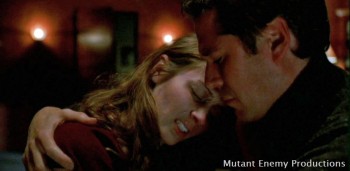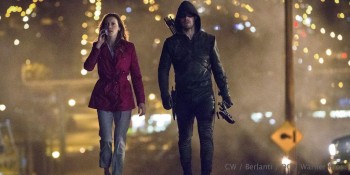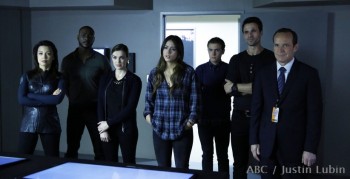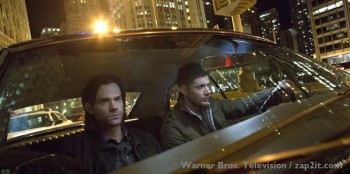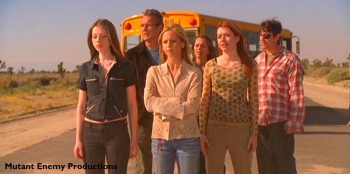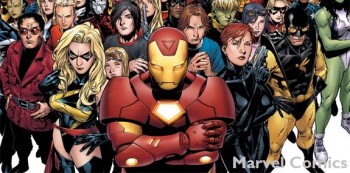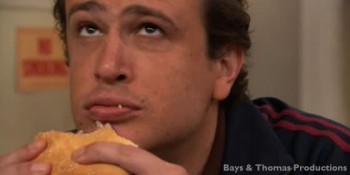Monday will mark 10 years since fans said goodbye to Joss Whedon’s Angel. The Buffy the Vampire Slayer
spinoff was often darker and more adult than its predecessor, but every bit as good. If you’re anything like me, you’re probably having a hard time believing it could possibly have been an entire decade since the show was on the air. (Even harder to believe: that means it’s been 11 since Buffy closed the Hellmouth and left Sunnydale!) In honor of this anniversary, I’ve compiled a list of what I believe to be the top 10 episodes of Angel.
10. “Dead End” (Season 2, Episode 18): The Wolfram & Hart law firm, front for a demon cabal, is behind the replacement of Lindsey’s hand, and he is surprised to discover it has a mind of its own. Meanwhile, Angel Investigations looks into a vision Cordelia has had of a man stabbing himself in the eye — an eye that had been transplanted by the same clinic that replaced Lindsey’s hand. I may be totally biased when it comes to this episode as I am a big fan of Christian Kane. I always loved the character of Lindsey: I loved that while he worked for an evil law firm, he was conflicted deep down about his involvement in the work. More than once, we saw the moral conflict within Lindsey, and it helped to make him a really interesting character. Plus, he and Angel had great on-screen chemistry; I loved seeing the two interact. This episode also introduced me to the fact that Kane is a great singer; he even released an album several years ago.
9. “Smile Time” (S5, E14): Angel and his team investigate a children’s television program that appears to be sucking the life-force out of its viewers. In the course of his investigation, Angel is turned into a one-foot-tall puppet. “Smile Time” is to Angel what “Once More With Feeling” was to Buffy the Vampire Slayer. The plot seems utterly ridiculous — and it kind of was, yet you just can’t help but enjoy it. Watching Puppet-Angel rolling on the ground, trying to fight Spike was a classic moment in Angel history and led to one of my favorite Spike lines ever: “You’re a wee puppet man!”
8. “Soulless” (S4, E11): In an attempt to learn more about The Beast that is coming, Team Angel decides to remove Angel’s soul in order to get information from his cursed alter ego, Angelus. Angelus tries to take advantage of the situation by turning everyone against each other. This episode was light on action, but David Boreanaz really shines as Angelus. He’s done some of his best work on both Buffy and Angel in that alternate role, and this is possibly one of his best performances.
7. “There’s No Place Like Plrtz Glrb” (S2, E22): The four-episode Pylea arc that closes season 2 concludes with Angel and the gang attempting to escape from the hell dimension Pylea. I really loved this entire storyline simply for the change of pace from the usual darkness of the show. These episodes also introduced us to Fred, whom I loved almost immediately. I’ll never forget the first time I watched this episode and saw Lorne’s severed head speaking — how quickly I went from sadness and horror to relief and amusement. The lightness of this episode, however, was juxtaposed in the end with the arrival of Willow to inform Angel of Buffy’s death back in Sunnydale.
6.”Are You Now or Have You Ever Been” (S2, E2): After its offices exploded in season 1, Angel Investigations is homeless until Angel rediscovers an abandoned hotel where he had spent time in the 1950s. This episode showed how easily the humans can become the monsters, as the guests of the hotel are influenced by a paranoia-demon hiding within the hotel. When they all turn against Angel, he gives up on humanity and leaves them in the hands of the demon. This episode was a fascinating look into Angel’s back story and part of his psychology.
5. “Not Fade Away” (S5, E22): The final episode of Angel was designed to be a season finale, not series, so it ended with a huge cliffhanger that left many fans frustrated. This episode makes my list because, while it may have been a bad series finale in some people’s eyes, it was still a good episode. (And it seemed appropriate to me to see Angel and the gang — those who were still alive, at least — go out fighting.) There were a lot of things I loved about this episode, but “Fred” and Wesley‘s goodbye was possibly the most beautiful and most heartbreaking. The one thing I still find fault with is Lorne being charged with killing Lindsey: not only did the idea that Lorne would kill anyone bother me (though that issue was certainly addressed by Lorne’s reaction to the assignment), but I agreed with Lindsey in that it should have been Angel who did the deed. Dying by Lorne’s hand just felt anti-climactic, which is why this episode doesn’t make it to No. 1 on my list, as it does on many others.
4. “I Will Remember You” (S1, E8): Buffy shows up in Los Angeles to yell at Angel for not letting her know he had been in Sunnydale at Thanksgiving. When a demon attacks, Angel is turned human and spends several happy hours with Buffy. However, he learns that if he remains human, those he cares about will die, so the day must be reset. I, like many Angel/Buffy shippers, really loved this episode. I enjoyed seeing what Angel and Buffy could be like as a normal, human couple. What really makes this episode great, though, is when Buffy finds out she will not be allowed to remember this day — only Angel will remember what happens.
3. “You’re Welcome” (S5, E12; the 100th episode): Cordelia awakes from her coma and shows up at Wolfram & Hart to help Angel. I had been disappointed with how things ended for Cordelia the previous season, so I was relieved that they brought her back one more time. This episode was a much more fitting farewell for her character. It also had a lot of references to the early days of Angel Investigations, including Doyle’s attempts to make a commercial for the business. This episode felt more like the old pre-Wolfram-&-Hart Angel, and I really appreciated that. The final twist was heartbreaking, but not entirely unexpected. This was a well-written episode and one of Charisma Carpenter’s shining moments.
2. “Hero” (S1, E9): Angel, Cordelia, and Doyle work to save a group of demon refugees from an evil clan of demons known as the Scourge. In order to stop the Scourge’s deadly weapon, Doyle sacrifices himself to save the others. I loved the half-demon Doyle from the beginning, and his death and sacrifice were heartbreaking. I had also loved Cordelia and Doyle’s growing flirtation, making his parting words to Cordelia (as his demon form emerges), all the more tragic: “Too bad we’ll never know if this is a face you could learn to love.” I think this was the best episode of the first season, and it remains one of my all-time favorite episodes (as well as one of the saddest). I admit, I still get teary-eyed when I see it.
1. “Hole in the World” (S5, E15): Angel’s most tragic episode is also its best. When Fred becomes infected with a disease from an ancient sarcophagus that’s slowly killing her, the team works desperately to attempt to save her life. This episode was amazing and oh-so-heart-wrenching. Watching everyone, even Spike, try so hard to save Fred as Wesley slowly begins to realize nothing can be done was tragic. Then you get that final gut punch in the end when a demon takes up residence in Fred’s body. This episode was so well-written and the entire cast put in excellent performances. Amy Acker’s work was flawless in this episode (and she continued to impress the rest of the season with her portrayal of Ilyria).
So there’s my list. It’s not easy to narrow down an entire series to just 10 episodes, especially when the series is as good as Angel or Buffy. Plus, I had to resist the urge to put mostly season 5 episodes on this list; I still believe season 5 was the best, and there are so many episodes from that year that I loved.
Did your favorites make this list? If not, feel free to share your own in the comments below!
